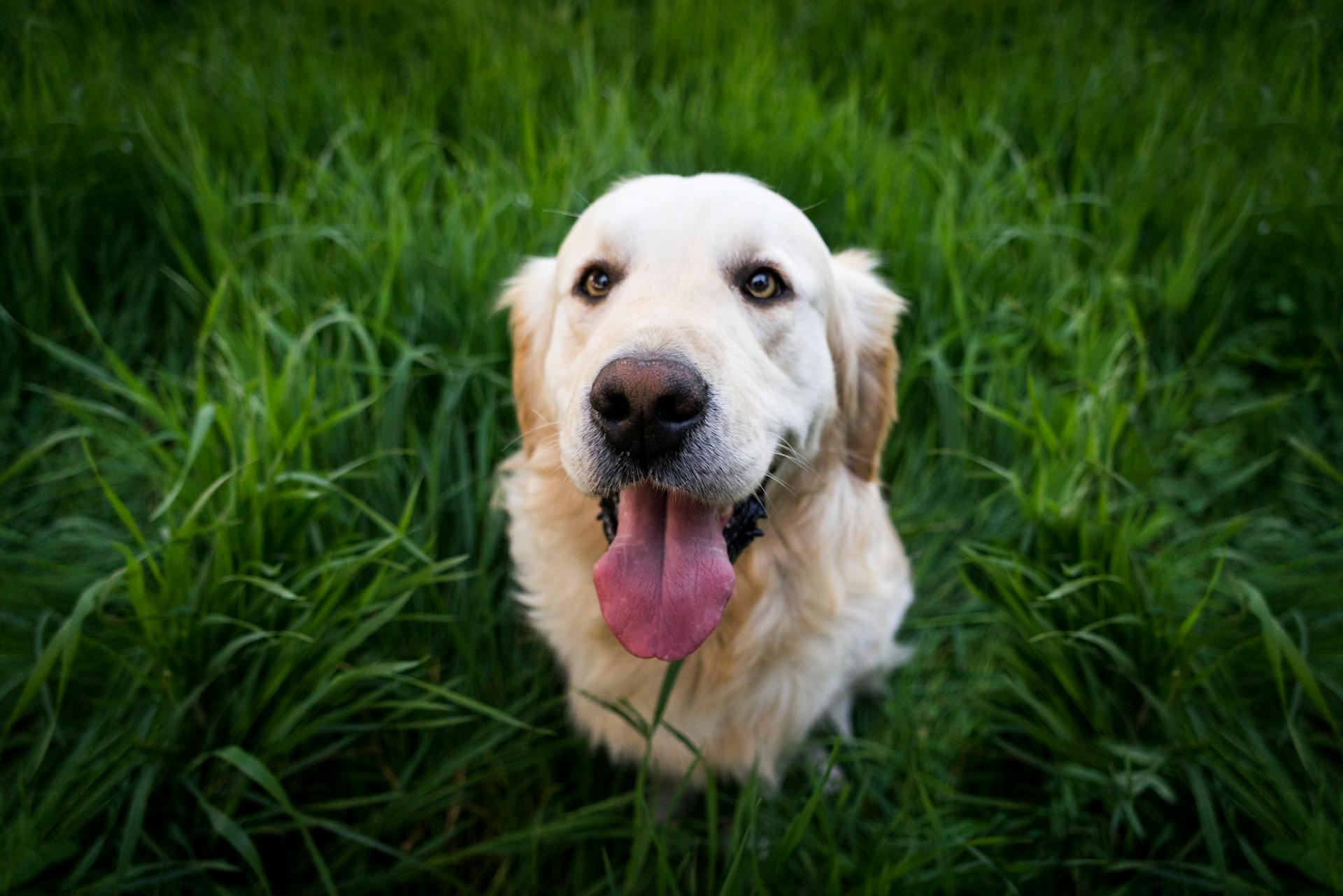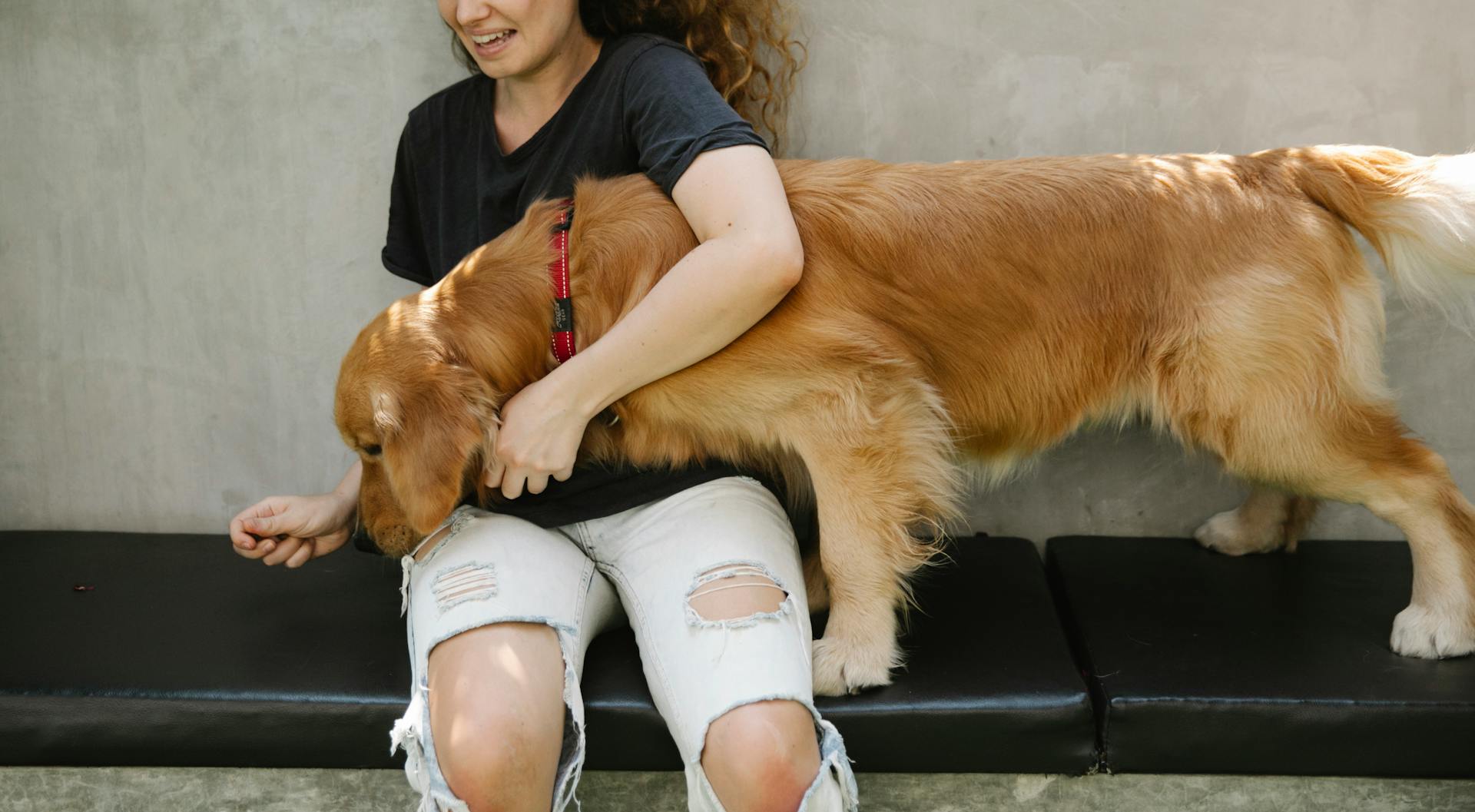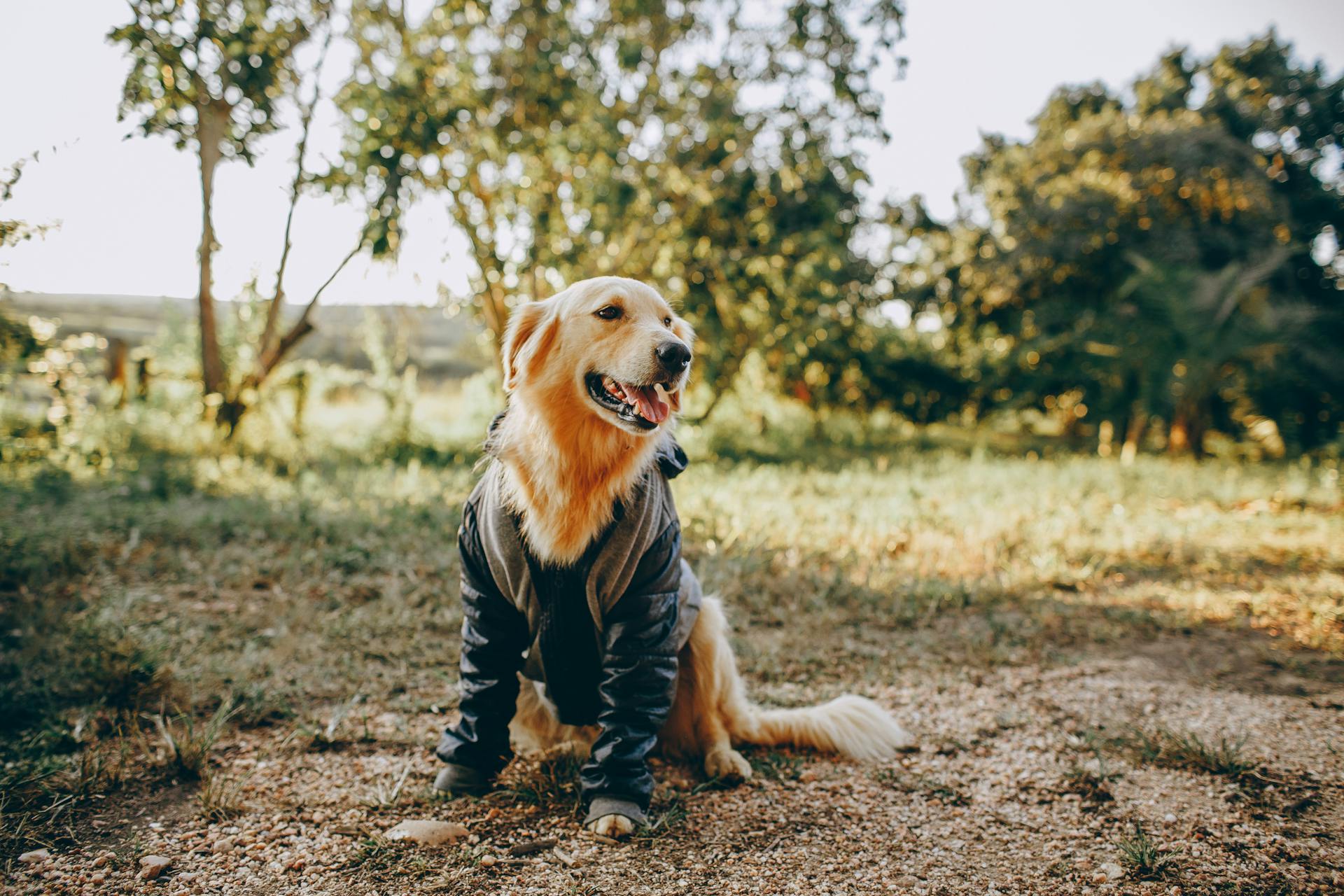
Golden Retrievers are one of the most popular breeds in the world, and for good reason - they're friendly, loyal, and love to please. They originated in Scotland in the late 1800s as a hunting breed.
Their thick coats require regular grooming to prevent matting and tangling. Golden Retrievers shed heavily twice a year, so be prepared for a lot of dog hair.
Golden Retrievers are generally great with children, but as with any breed, it's essential to socialize them well to ensure they're comfortable around kids. With proper training and care, Golden Retrievers can make wonderful family pets.
Their intelligence and eager-to-please nature make them highly trainable, and they're often used as therapy dogs, search and rescue dogs, and service dogs.
Related reading: Cons of Boxer Dogs
Physical Characteristics
Golden Retrievers are a medium-sized breed with a sturdy and balanced build, reflecting their working and sporting heritage. They typically weigh between 55 to 75 pounds and stand at 21 to 24 inches tall.
Males tend to be on the larger side, weighing between 65 to 75 pounds and standing at 23 to 24 inches tall, while females are generally smaller, weighing between 55 to 65 pounds and standing at 21 to 22 inches tall.
Their broad head features a well-defined stop, dark eyes set well apart, and a wide and powerful muzzle. The neck is muscular and fairly long with loose-fitting skin.
The Golden Retriever has a double coat, consisting of a soft, insulating undercoat and a thick, water-resistant outer coat. They typically have luxurious feathering on their legs, bellies, and tails.
Their expressive eyes reflect their good-natured hearts, and their noses are typically black or brown. The pigment may fade in cold weather, turning their noses pink, in a benign phenomenon commonly called “snow nose.”
Here are the standard coat colors recognized by the American Kennel Club (AKC): dark golden, golden, and light golden. However, Golden Retrievers come in many shades, ranging from cream to deep red.
Their long, feathery tails are carried with a "merry action", a lively and joyful way the dog moves their tail.
You might enjoy: Bernedoodle Coat Types
Temperament and Personality
Golden Retrievers are naturally outgoing and eager to please, loving people and social outings.
They thrive in homes with lively environments and are excellent dogs for families with young children. However, introducing them to household members, especially smaller ones like children and cats, requires caution.
Golden Retrievers are intelligent and quick learners, making them easy to train. They were bred to be gundogs, retrieving waterfowl with their soft mouths, and often serve as guide dogs, therapy dogs, and search-and-rescue dogs.
For optimal health, Golden Retrievers need ample mental and physical exercise. Even the best-trained Goldens can be mischievous, so be prepared for occasional capers.
Their friendly demeanor makes them excellent companions, but they must be well-raised and well-trained to make the most of their heritage. Early socialization is crucial to ensure your Golden puppy grows into a well-rounded dog.
Golden Retrievers are generally calm and biddable, being very easy to train and extremely keen to please their master. They're often completely devoid of guarding instincts.
Their gentle nature makes them perfect playmates for children, and they're patient and tolerant, even when little ones are a bit too rambunctious.
Explore further: Golden Retriever Puppies Training
Dog Care
Golden Retrievers require daily exercise to stay happy and healthy, so if you like hiking or jogging, they'll happily join you. They need 20-30 minutes of vigorous exercise twice daily to keep them mellow when they're back inside.
Golden Retrievers shed a lot, so be prepared for fur tumbleweeds, dirt, and drool. They need to be brushed at least every one to three days to prevent matting and remove loose fur.
To prevent matting, focus on areas prone to tangles, such as behind the ears, under the belly, and around the tail. Regular brushing and combing can help remove any knots or tangles before they become severe.
Golden Retrievers have a double coat that sheds heavily in the spring and fall, so they'll need to be raked out more frequently during those times. They also shed moderately in the winter and summer.
To keep your Golden Retriever's coat clean and healthy, bathe them every few months and use a high-quality dog shampoo suitable for their coat type. Trim their nails regularly to prevent them from becoming too long and causing discomfort.
See what others are reading: Golden Retriever Blowing Coat
Here's a quick checklist to help you keep your Golden Retriever's coat in good condition:
- Bathe every few months
- Use a high-quality dog shampoo
- Trim nails regularly
- Check and clean ears regularly
Regular grooming is essential to prevent infections and keep your Golden Retriever's coat looking its best. Brush their teeth at least two or three times a week to remove tartar buildup and bacteria.
Training and Diet
Golden Retrievers are highly intelligent and eager to please, making them a joy to train. They respond best to positive reinforcement training, which uses treats or toys as rewards for desirable behavior.
Individual personalities play a big role in determining whether a Golden is cut out for service dog work, so it's essential to consider their unique characteristics. Goldens can easily master basic obedience training commands like sit and stay, and even be taught to retrieve different toys by name.
Golden Retrievers can develop food allergies, which may cause itchy skin and excessive licking, so it's crucial to work with a veterinarian to manage these reactions by changing their diet.
Training

Training is a breeze with Golden Retrievers, as they're highly intelligent and eager to please. Goldens can easily master basic obedience training commands like sit and stay.
They respond best to positive reinforcement training, which uses treats or toys as rewards for desirable behavior.
Goldens are naturally inclined to learn and please their owners, making them a joy to train.
Diet
Your Golden Retriever's diet is crucial for their overall health and well-being. Experts recommend a complete and balanced commercial dog food, but there's no one-size-fits-all feeding chart.
Their individual needs will vary based on age, weight, and activity level, so it's essential to talk to your vet to figure out the best diet for your dog. Your vet can help you determine the right amount and type of food for your Golden.
Golden Retrievers can develop food allergies, which may cause itchy skin and excessive licking. You can manage these reactions by working with a veterinarian and changing their diet.
To ensure your Golden is getting the right amount of food, measure their meals and feed them twice a day rather than leaving food out all the time. This will help prevent overeating and maintain a healthy weight.
You might like: Border Terrier Weight
Use

The Golden Retriever is one of the most commonly kept breeds of companion dog in the Western world.
They're often used as guide dogs and therapy dogs, and may compete in obedience trials and other dog sports.
A Golden Retriever can be trained for various roles, but it's essential to choose the right line for the job, whether it's a pet, show, or working line.
Those used as gundogs are usually from working lines specifically bred for field use; dogs from pet or show lines are rarely suitable.
The breed's traditional dense double coat provides water resistance and insulation, making it well-suited to working in cold and wet conditions.
However, its long coat causes it to sit low in the water when swimming, making it less of a strong swimmer compared to other retriever breeds.
Despite its potential as a hunting companion, the Golden Retriever is generally quite slow to mature, particularly compared to the Labrador Retriever.
More Golden Retrievers are bred as pets or for the show ring than for hunting, making it harder for sportsmen to find pups bred from proven working lines.
Explore further: Golden Breeds of Dogs
Exercise and Health
Golden Retrievers are a high-energy breed that requires regular exercise to stay happy and healthy. They need at least 30 minutes to 1 hour of walking daily to keep them physically and mentally stimulated.
Their intelligence and willingness to learn make them highly trainable, and they respond well to positive reinforcement techniques. Obedience training is essential for establishing good behavior and ensuring a well-behaved and obedient companion.
Golden Retrievers are prone to certain health issues, including cancer, which is the biggest health issue for the breed, with up to 65% of them dying of cancer-related causes. Regular veterinary check-ups can help detect potential health problems early on.
To keep your Golden Retriever healthy, it's essential to follow preventative health protocols and be aware of potential health concerns. Here are some common health issues that can affect Golden Retrievers:
- Cancer: lymphoma and hemangiosarcoma are two of the most common types of cancer seen in Golden Retrievers.
- Skin Infections and Allergies: their thick undercoat can attract skin-irritating bacteria, resulting in rashes or hot spots.
- Hip Dysplasia: roughly 8.5% of Goldens have hip dysplasia, which can lead to degenerative joint disease and arthritis.
- Heart Conditions: they are prone to certain heart conditions, like subaortic stenosis, which can be detected through a veterinary exam.
- Hypothyroidism: low thyroid hormone production is a common condition in Golden Retrievers, which can be treated with daily medication.
- Eye Conditions: pigmentary uveitis and progressive retinal atrophy are inherited conditions that can lead to cataracts and glaucoma.
Exercise Needs
Golden Retrievers are a high-energy breed that requires regular exercise to stay happy and healthy. They need at least 30 minutes to 1 hour of walking daily, which can be broken up into shorter walks if you have a busy schedule.
To keep your Golden Retriever active, you'll want to engage them in a variety of physical and mental activities. Playing games like fetch and chase can be a great way to burn off their energy. You can also try incorporating scent games like "find it" into your playtime routine.
Interactive dog toys are another great way to keep your Golden Retriever's mind engaged. They're perfect for stuffing with treats or peanut butter to keep your dog busy for hours. And don't forget to provide unstructured off-leash time, allowing your dog to run and play freely.
Swimming is also a great exercise option for Golden Retrievers, providing a low-impact way to get some exercise while having fun in the water. If you have access to a pool or a nearby lake, be sure to take advantage of this opportunity.
Here are some exercise ideas to get you started:
- Fetch and chase
- Scent games like "find it"
- Interactive dog toys
- Unstructured off-leash time
- Swimming (if possible)
Remember, a large yard doesn't give you an excuse to be lazy. Join your Golden Retriever outside for playtime to help them burn off their endless energy.
Health
Golden Retrievers are generally healthy dogs, but like any breed, they can be prone to certain health issues. Their life expectancy is around 10 to 12 years, but some can live up to 14 years without issue.
Cancer is the biggest health concern for Golden Retrievers, with up to 65% dying from cancer-related causes. Two of the most common types of cancer are lymphoma and hemangiosarcoma.
Skin infections and allergies are also common in Golden Retrievers, particularly due to their thick undercoat. If you notice excessive itching or redness/rashes on their skin, it's essential to make an appointment with your veterinarian.
Golden Retrievers are prone to hip dysplasia, a deformity of the hip joint that occurs during puppyhood. Roughly 8.5% of Goldens have hip dysplasia, which can lead to degenerative joint disease and arthritis.
Heart conditions, such as subaortic stenosis, are also a concern for Golden Retrievers. This condition can be detected as an audible murmur during a veterinary exam, and may require an echocardiogram (ultrasound of the heart) for further diagnosis.

A 2024 UK study found a life expectancy of 13.2 years for the breed, compared to an average of 12.7 years for purebreds.
Here are some common health issues to be aware of:
- Cancer: lymphoma and hemangiosarcoma
- Skin infections and allergies
- Hip dysplasia
- Heart conditions: subaortic stenosis
- Hypothyroidism
- Eye conditions: pigmentary uveitis and progressive retinal atrophy
Regular veterinary check-ups and preventative health protocols can help identify potential health issues early on, allowing for prompt treatment and care.
History and Overview
The Golden Retriever breed originated in the Scottish Highlands through the efforts of Dudley Marjoribanks, the first Lord Tweedmouth, who selectively bred different dog breeds to create an energetic pup who could retrieve objects from the water and on land.
Golden Retrievers are highly intelligent, sociable, beautiful, and loyal dogs that excel in obedience training and are often seen competing in dog sports such as agility and competitive obedience.
They have a beautiful double coat that is dense and water-repellent, but it does require regular grooming to prevent matting and to keep it in good condition. Golden Retrievers are moderate shedders throughout the year, with heavier shedding periods during shedding seasons.
Curious to learn more? Check out: Golden Retriever Water Dog
Golden Retrievers were initially bred as a gun dog, primarily used for hunting waterfowl, and their exceptional retrieving abilities and versatile nature made them highly sought after in the field.
The Golden Retriever was officially recognized by the Kennel Club in England in 1911, and later by the American Kennel Club in 1932. Today, the Golden Retriever is the second most popular breed in the U.S.
Golden Retrievers are known for being patient and gentle with children, making them a popular choice for families. However, they are not typically good watchdogs, as they are inclined to be friendly towards strangers.
Frequently Asked Questions
Do Golden Retrievers like to cuddle?
Yes, Golden Retrievers are known for their affectionate nature and love to cuddle with their owners. However, it's essential to respect their personal space and boundaries.
Featured Images: pexels.com


